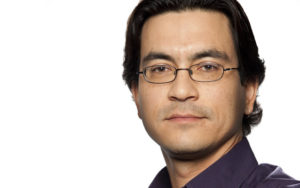 The Host of CBC’s Cross Country Checkup, Duncan McCue, will be the keynote speaker at this year’s Joseph Howe Symposium, this Saturday in Halifax.
The Host of CBC’s Cross Country Checkup, Duncan McCue, will be the keynote speaker at this year’s Joseph Howe Symposium, this Saturday in Halifax.
The symposium, presented for the 12th time by the University of King’s College School of Journalism, will engage with the crucial question of reconciliation with the Indigenous people of
Canada. Everyone is welcome.
McCue, a member of the Chippewas of Georgina Island First Nation, in Ontario, will explore what reconciliation means for the media. Also an author, educator and King’s graduate, he speaks at 10 a.m.
After lunch, at 12:45, Naiomi Metallic, Assistant Professor, and Chancellor’s Chair in Aboriginal Law and Policy at Dalhousie University’s Schulich School of Law, will speak about the role of treaties in the relationship between Indigenous and non-Indigenous Canadians. Heather McNeill, QC, a lawyer with Dalhousie Legal Aid and Acting Director of the law school’s Indigenous Blacks & Mi’kmaq Initiative, will moderate and facilitate questions from the audience.
To cap off the day, Stephen Augustine, Hereditary Chief on the Mi’Kmaq Grand Council and Dean of Unama’ki College and Aboriginal Learning at Cape Breton University, will discuss the importance of language and culture in Indigenous communities and how journalists can best use language when covering these communities. He’ll also talk about his own work with the Truth and Reconciliation Commission, to which he was an elder advisor.
This year’s Howe springs from the commission’s 2015 report. It concluded Canada engaged in a century of cultural genocide when it established residential schools and tried to assimilate Indigenous peoples into white society. Over six years, the commission heard thousands of stories from former students and their families of abuse, isolation, and wilful indifference to students’ welfare at residential schools, the last of which closed only in the 1990s.
As a step to reconciliation, the commission called on Canada’s journalism schools to require education for all students “on the history of aboriginal peoples, including the history and legacy of residential schools.”
This year’s Howe symposium is a first step for King’s in responding to that call. The daylong event will focus on how journalists can cover Indigenous communities responsibly, how they can report fairly and avoid stereotypes, and what it means to respond to the commission’s calls to action.
“The task of reconciliation is something we all must all engage with, and this event is one small step in that process,” said Tim Currie, the journalism school’s director. “The 2017 Howe Symposium will allow us to engage with these crucial issues, with our students and the wider public in Halifax.”
The day will begin with a traditional Mi’kmaq prayer, led by King’s Board member and Nancy’s Chair in Women’s Studies at Mount Saint Vincent University, Catherine Martin.
The symposium is free. It takes place all day Saturday, January 14, in Paul O’Regan Hall at the Halifax Central Library, 5440 Spring Garden Road in downtown Halifax.
The event honours the life and legacy of Joseph Howe, a father of both Confederation and free speech in Canada.

